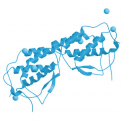
- Remove this product from my favorite's list.
- Add this product to my list of favorites.
Products
Newsletter
 |  |  |  |  |  |

Background:
FMS-like tyrosine kinase 3 ligand (Flt-3 Ligand), also known as FL, Flt3L and FLT3LG, is an α-helical cytokine that promotes the differentiation of multiple hematopoietic cell lineages. FLT3LG is expressed as a noncovalentlylinked dimer by T cells and bone marrow and thymic fibroblasts. Each 36 kDa chain carries approximately 12 kDa of N- and O- linked carbohydrates. FLT3LG is structurally homologous to stem cell factor (SCF) and colony stimulating facor 1 (CSF-1). FLT3LG acts as a growth factor that increases the number of immune cells by activating the hematopoietic progenitors. It also induces the mobilization of the hematopoietic progenitors and stem cells in vivo which may help the system to kill cancer cells. FLT3LG induces the expansion of monocytes and immature dendritic cells as well as early B cell lineage differentiation. FLT3LG cooperates with IL2, IL6, IL7, and IL15 to induce NK cell development and with IL3, IL7 and IL11 to induce terminal B cell maturation. Animal studies also show FLT3LG to reduce the severity of experimentally induced allergic inflammation. FLT3LG is crucial for steady-state pDC and cDC development. A lack of FLT3L results in low levels of DCs.
Source
Recombinant Human Flt-3 Ligand, premium grade(FLL-H5218) is expressed from human 293 cells (HEK293). It contains AA Thr 27 - Pro 185 (Accession # P49771-1).
Predicted N-terminus: Thr 27
It is produced under our rigorous quality control system that incorporates a comprehensive set of tests including sterility and endotoxin tests. Product performance is carefully validated and tested for compatibility for cell culture use or any other applications in the early preclinical stage. When ready to transition into later clinical phases, we also offer a custom GMP protein service that tailors to your needs. We will work with you to customize and develop a GMP-grade product in accordance with your requests that also meets the requirements for raw and ancillary materials use in cell manufacturing of cell-based therapies.
Molecular Characterization
This protein carries no "tag".
The protein has a calculated MW of 18.0 kDa. The protein migrates as 24 kDa, 27 kDa±3 kDa when calibrated against Star Ribbon Pre-stained Protein Marker under reducing (R) condition (SDS-PAGE) due to glycosylation.
Endotoxin
Less than 0.01 EU per μg by the LAL method.
Host Cell Protein
<0.5 ng/µg of protein tested by ELISA.
Host Cell DNA
<0.02 ng/μg of protein tested by qPCR.
Sterility
Negative
Mycoplasma
Negative.
Purity
>95% as determined by SDS-PAGE.
>95% as determined by SEC-MALS.
Formulation
Lyophilized from 0.22 μm filtered solution in PBS, pH7.4 with trehalose as protectant.
Reconstitution
Please see Certificate of Analysis for specific instructions.
For best performance, we strongly recommend you to follow the reconstitution protocol provided in the CoA.
Storage
For long term storage, the product should be stored at lyophilized state at -20°C or lower.
Please avoid repeated freeze-thaw cycles.
This product is stable after storage at:
-20°C to -70°C for 12 months in lyophilized state;
-70°C for 3 months under sterile conditions after reconstitution.
Bioactivity
Please refer to product data sheet.
(1) "IFlt3 ligand augments immune responses to soluble PD1-based DNA vaccine via expansion of type 1 conventional DCs"
Cai, Qiao, Wuri et al
Int Immunopharmacol (2024) 141, 112956
(2) "The causal relationship between immune cells mediating FIT3L, CCL4, OSM, and skin-derived deteriorated tumors"
Gong, Zhou, Hou et al
Skin Res Technol (2024) 30 (7), e13774
(3) "FLT3+ DC inhibits immune rejection via interaction with Treg in liver transplantation"
Zhang, Huang, Li et al
Int Immunopharmacol (2024) 137, 112289
Showing 1-3 of 1412 papers.
Follow us